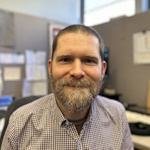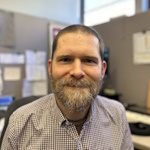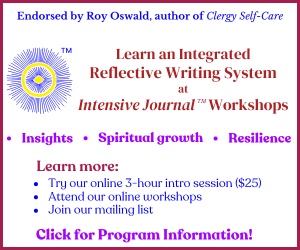You can only gain access to certain items and special pricing if you have logged in. Login Now.

Next Steps for Chaplaincy and Sustainability
Presented by Paul Goodenough MDiv BCC
Format:
Streaming Video
NonMember - $102.00
Member - $58.00
Description:
Overview:
If you have ever wondered, "What on earth can I do about climate change?," this webinar is for you.
We know that climate change is presenting unprecedented challenges for us as individuals and the communities we serve. What we need to emphasize is that we also have a world of opportunity to create a healthier and more equitable future for all. This webinar will give you a variety of tools:
- care effectively for those who are already experience climate change-related spiritual distress
- communicate effectively about the adverse and unjust health impacts of environmental racism
- develop self-knowledge regarding the healthcare sector's carbon emissions and figuring out one's own carbon footprint
- practical interventions that you can start today from range from individual actions to systemic advocacy
Section 4 of the Common Code of Ethics for Chaplains includes mandates to "promote justice" and "advocate for changes...that would honor spiritual values and promote healing." Climate change is already visiting its worst health effects on those who have already endured centuries of historic and systemic injustice. Advocating for a just transition to clean energy within our institutions is directly connected to our role as advocates for the holistic well-being of those we serve--not to mention ourselves and our communities. The good news is that many climate solutions have holistic health side effects: cleaner air, healthier bodies, and more resilient communities.
Learning Objectives: 1. We will better understand the connection between systemic health inequities and climate change 2. We will learn about the carbon emissions caused by the health care industry 3. We will learn chaplain-led interventions to decrease moral distress and improve public health
Presenters:
 Paul Goodenough MDiv BCC is a palliative care chaplain in the IU Health system, serving IU Health Methodist and University Hospitals in Indianapolis, IN.
Paul has lived most of his life in the US Great Lakes and Midwest regions. He also spent time in Costa Rica and Paraguay as a missionary kid. These experiences bred in him a love of diversity and a global perspective. In 2012, Paul began his chaplaincy career with a summer internship at Northwestern Memorial Hospital in Chicago, IL. After Divinity School at the University of Chicago, he did his chaplain residency at Advocate Lutheran General Hospital in Park Ridge, IL. After that, Paul served as Bishop Anderson House’s first Chaplain Fellow at John H Stroger Cook County Hospital, focusing in Trauma, Critical Care, and Pediatrics. Paul and his wife Rachel became parents in 2017. Shortly after that they moved to be closer to family in Indianapolis. There, Paul joined the IU Health Palliative Care service line where he has served since 2018. When he’s not at work, he’s hanging with his family and playing music.
In recent years, the importance of addressing the social determinants of health has sharpened into focus for everyone–chaplaincy included. There is no greater social determinant of health at this time than environmental injustice and the climate change that is its greatest symptom. The great opportunity amid the challenge of this time is for chaplains to take leadership on sustainability. Paul proposes we do this primarily by identifying the moral and spiritual impacts of climate injustice, alleviating moral distress and eco-anxiety, advocating in our institutions, and walking the walk of sustainability in the provision of spiritual care.
Paul Goodenough MDiv BCC is a palliative care chaplain in the IU Health system, serving IU Health Methodist and University Hospitals in Indianapolis, IN.
Paul has lived most of his life in the US Great Lakes and Midwest regions. He also spent time in Costa Rica and Paraguay as a missionary kid. These experiences bred in him a love of diversity and a global perspective. In 2012, Paul began his chaplaincy career with a summer internship at Northwestern Memorial Hospital in Chicago, IL. After Divinity School at the University of Chicago, he did his chaplain residency at Advocate Lutheran General Hospital in Park Ridge, IL. After that, Paul served as Bishop Anderson House’s first Chaplain Fellow at John H Stroger Cook County Hospital, focusing in Trauma, Critical Care, and Pediatrics. Paul and his wife Rachel became parents in 2017. Shortly after that they moved to be closer to family in Indianapolis. There, Paul joined the IU Health Palliative Care service line where he has served since 2018. When he’s not at work, he’s hanging with his family and playing music.
In recent years, the importance of addressing the social determinants of health has sharpened into focus for everyone–chaplaincy included. There is no greater social determinant of health at this time than environmental injustice and the climate change that is its greatest symptom. The great opportunity amid the challenge of this time is for chaplains to take leadership on sustainability. Paul proposes we do this primarily by identifying the moral and spiritual impacts of climate injustice, alleviating moral distress and eco-anxiety, advocating in our institutions, and walking the walk of sustainability in the provision of spiritual care.
How It Works:
When you purchase this recording, you will receive a link to access the recording and handouts. There will also be a link to access in the My Downloads and Links section of your APC profile.
Product Details:
| Product ID: | WR-2401 |
|---|---|
| Publication Year: | 2024 |
| Pages, Size, or Length: | 90 Minutes (1.5 CE hours) |

